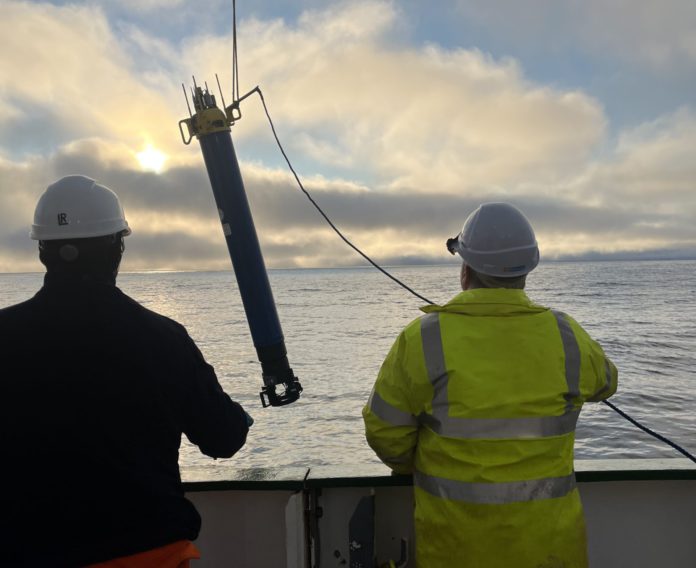Top Stories
Galway Scientists Capture Rare Ocean Mixing in Arctic Waters

BREAKING: A research team from the University of Galway has made a groundbreaking discovery in the Greenland Sea, capturing a rare ocean mixing process that could significantly enhance our understanding of Arctic climate change. The team, aboard the RV Celtic Explorer, conducted extensive measurements during their summer 2023 expedition, revealing critical insights that could reshape climate models globally.
The researchers observed a phenomenon known as cabbeling, which occurs when two ocean water masses with different temperatures and salinities mix, resulting in a denser mixture that sinks. This process triggers turbulence and vertical mixing, which can intensify heat transfer from the ocean’s depths to the surface, impacting melting Arctic sea ice.
Kevin McGraw, a PhD candidate leading the study, stated, “Cabbeling is rarely observed because it is sporadic and short-lived.” The team’s innovative approach utilized the Air-Sea Interaction Profiler (ASIP), a state-of-the-art autonomous underwater instrument that allowed for real-time observation of cabbeling, detecting changes within seconds.
This finding is crucial as the Greenland Sea is expected to experience increased freshwater outflows due to melting ice in a warmer climate, fundamentally altering regional ocean dynamics. Understanding cabbeling’s role will enhance predictions of ocean heat transport and its effects on polar regions, where warming is accelerating and sea ice is rapidly declining.
Professor Audrey Morley emphasized the importance of density gradients in the Atlantic Meridional Overturning Circulation (AMOC), stating, “High-latitude cabbeling may alter this system, affecting global heat distribution.” The AMOC is vital for regulating climate patterns, and shifts in its behavior could have widespread consequences.
Professor Brian Ward, an expert in ocean physics, remarked, “These observations highlight how small-scale processes like cabbeling can have broader implications for climate change.” The research underscores the need for combining advanced ocean technology with field observations to unravel the complexities of climate interactions.
As the world grapples with the realities of climate change, the implications of this study could not be more urgent. The findings from the University of Galway are expected to influence future climate models and strategies aimed at mitigating the impacts of global warming.
The research team’s expedition, which took place along the East Greenland Polar Front, represents a significant step forward in understanding the Arctic’s role in global climate dynamics. As scientists continue to study these critical processes, the findings will be pivotal for climate science and policy-making in the years to come.
Stay tuned for further updates as this story develops, shedding light on the complexities of our changing climate and the efforts being made to understand it.
-

 Top Stories3 months ago
Top Stories3 months agoTributes Surge for 9-Year-Old Leon Briody After Cancer Battle
-

 Entertainment4 months ago
Entertainment4 months agoAimee Osbourne Joins Family for Emotional Tribute to Ozzy
-

 Politics4 months ago
Politics4 months agoDanny Healy-Rae Considers Complaint After Altercation with Garda
-

 Top Stories4 months ago
Top Stories4 months agoIreland Enjoys Summer Heat as Hurricane Erin Approaches Atlantic
-

 World5 months ago
World5 months agoHawaii Commemorates 80 Years Since Hiroshima Bombing with Ceremony
-

 Top Stories3 months ago
Top Stories3 months agoNewcastle West Woman Patricia Foley Found Safe After Urgent Search
-

 Top Stories5 months ago
Top Stories5 months agoFianna Fáil TDs Urgently Consider Maire Geoghegan-Quinn for Presidency
-

 World5 months ago
World5 months agoCouple Convicted of Murdering Two-Year-Old Grandson in Wales
-

 World5 months ago
World5 months agoGaza Aid Distribution Tragedy: 20 Killed Amid Ongoing Violence
-

 World5 months ago
World5 months agoAristocrat Constance Marten and Partner Convicted of Infant Murder
-

 Top Stories4 months ago
Top Stories4 months agoClimbing Errigal: A Must-Do Summer Adventure in Donegal
-

 Top Stories4 months ago
Top Stories4 months agoHike Donegal’s Errigal Mountain NOW for Unforgettable Summer Views









